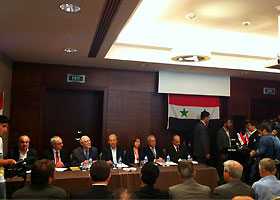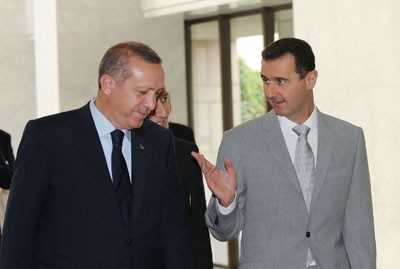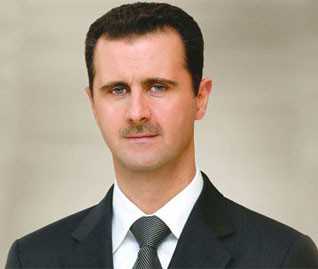Syria Opposition launched a National Council in Istanbul
(Dp-news)
 ISTANBUL- Syrian dissidents meeting in Turkey have formally announced the creation of the final Syrian National Council. The structure and aims of this council were announced Sunday at a news conference in Istanbul.
ISTANBUL- Syrian dissidents meeting in Turkey have formally announced the creation of the final Syrian National Council. The structure and aims of this council were announced Sunday at a news conference in Istanbul.
Opposition figure and Paris-based Burhan Ghalioun, one of the main opposition figures abroad, read out the founding statement of the council, which was signed by major Syrian opposition figures.
“The Syrian Council is open to all Syrians. It is an independent group personifying the sovereignty of the Syrian people in their struggle for liberty,” Ghalioun said.
SNC aims “to unify all groups at Syria opposition and looks at pushing forward on ground protests inside the country to topple the regime and establish the new democratic Syrian civil state.” according to its statement.
Ghalioun said that peaceful means are the only solutions to the conflict in Syria.
Ghalioun assured that the aims of the council were to present a united opposition front and overthrow Syria’s regime. The newly formed council rejected foreign intervention but asked for U.N. articles that would protect civilians in the country.
It has also vowed to push for the creation of a democratically elected civilian state and to fulfill the aspiration and goals of the Syrian revolution that started six months ago.
Syrian NC statement also rejected any foreign interference in Syria and urged the international community to recognize the legitimacy of the group.
The council “is a frame for the opposition and the peaceful revolution and represents the revolution inside and outside,” Burhan Ghalioun, the chairman of almost 230-member council, told reporters in Istanbul.
Ghalioun said he had no worries about gaining the support of the international community and that the council expected to have a busy schedule of meetings with friendly countries.
In turn, Basma Kadhmani said that Syrian NC consists of three main bodies, a General Assembly, a Secretariat and Executive Committee.
Kadhmani said “Committee consists of 5 Muslim Brotherhood, 4 Damascus Announcement, 9 Independents, 4 Kurds, 6 local Activists and 1 Assyrian.”
Many Syrian opposition groups, committees and parties have already signed the announcement; Damascus Announcement, Muslim Brotherhood, Local Coordination Committees, General Council of Syrian Revolution in addition to many independent activists inside and outside Syria.
The Syrian National Council was first founded in the Turkish city in late August, when a group of Syrian opposition and activists had announced the creation of the primary Syrian National Council.
The Syrian government has banned most foreign journalists from entering the country and placed heavy restrictions on local media coverage, making it difficult to independently verify events and death toll on the ground.
The UN estimates that about 2,700 people have been killed in a violent government crackdown on pro-reform protests that began mid-March.
The government says that the movement against President al-Assad`s regime does not have popular support and blames violence on “armed terrorist groups”. It says that more than 700 soldiers and police have been killed in the uprising.
via Syria Opposition launched a National Council in Istanbul | English | NEWS | DayPress.






 Turkey finds its “zero-problems-with-neighbors” foreign policy severely compromised by upheavals in the Arab world. Relations with some of its closest friends, such as Syria, appear to be irrevocably damaged.
Turkey finds its “zero-problems-with-neighbors” foreign policy severely compromised by upheavals in the Arab world. Relations with some of its closest friends, such as Syria, appear to be irrevocably damaged. 